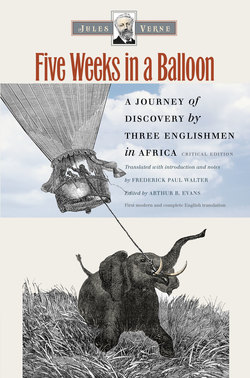Читать книгу Five Weeks in a Balloon - Jules Verne - Страница 22
На сайте Литреса книга снята с продажи.
Оглавлениеchapter 12
Crossing the strait—Mrima—Dick’s remarks and Joe’s recommendation—recipe for coffee—the district of Uzaramo—the unfortunate Maizan—Mt. Dutumi—night over a prickly pear1—the doctor’s maps.
The sky was clear, the wind moderate; the Victoria rose nearly straight up to an altitude of 1,500 feet, which was indicated by a drop of 1 and ⅚ inches2 in the mercury column of their barometer.
At that altitude a more emphatic current carried the balloon toward the southwest. What a magnificent sight unfolded beneath our travelers’ eyes! The island of Zanzibar offered a view of its entire expanse, standing out in a darker color as if on a huge world map; its fields reminded you of different-colored swatches in a sample book; woods and thickets were big leafy clusters.
The island’s residents looked like insects. The hoorays and shouts gradually died away in the air, and only booms from the ship’s cannons ruffled the envelope’s lower edges.
“What a gorgeous view!” Joe exclaimed, the first one to break the silence.
Nobody answered him back. The doctor was intently studying the changes in his barometer and recording the various details of his ascension.
Kennedy was looking too, and his eyes needed to be everywhere at once.
The sunlight came to the aid of their burner, and the gas’s pressure increased. The Victoria reached an altitude of 2,500 feet.
The Resolute took on the humble appearance of a small craft, and Africa’s coast was visible in the west as an immense border of foam.
“You’re not talking?” Joe said.
“We’re busy looking,” the doctor replied, aiming his spyglass at the mainland.
“As for me, I just have to talk.”
“Feel free, Joe! Talk all you like.”
And Joe treated himself to an awesome feast of nonsense syllables. Oohs, ahs, and wows erupted from his lips.3
While crossing the sea, the doctor thought it best to stay at that altitude; he could study a greater expanse of coastline; his thermometer and barometer hung inside the partly open tent, always within view; placed outside, a second barometer was for their use when they stood watch at night.
Propelled at a speed slightly faster than eight miles per hour, the Victoria had almost made it to the coast after another two hours. The doctor decided to drop closer to the ground; he cut back the flame of his burner, and the balloon soon descended to an altitude of 300 feet.
She hovered above Mrima, the name given this part of Africa’s east coast; heavy borders of mangroves protected its edges; the low tide exposed their thick roots, gnawed by the teeth of the Indian Ocean. The sand dunes that used to form the coastline were swelling along the horizon, and the summit of Mt. Nguru reared up in the northwest.
The Victoria passed close to a village that the doctor identified as Kaole on his map. All its citizens had gathered and were letting out shrieks of anger and fear; they fired their arrows in vain at this monster of the skies, which swayed majestically above all that impotent sound and fury.
The wind blew to the south, but the doctor had no worries about heading that way; on the contrary, it let him keep an eye on the trail blazed by Captains Burton and Speke.
After a while Kennedy grew as chatty as Joe; approving comments shot back and forth between the two.
“Who needs stagecoaches!” one of them said.
“Who needs steamboats!” said the other.
“Who needs railways,” Kennedy fired back. “You ride ’em across a country and can’t see where you’re going!”
“Now take a balloon!” Joe went on. “You feel like you aren’t even moving, while nature goes to the trouble of unrolling right under your eyes!”
“What a sight! What a marvel! What a thrill! Like dreaming in a hammock!”
Crossing the strait
“How about some lunch?” asked Joe, who had worked up an appetite in the open air.
“That’s a thought, my lad.”
“Well, cooking it won’t take long! It’ll just be crackers and canned meat.”
“And all the coffee you like,” the doctor added. “I’ll let you borrow a little heat from my burner—it has plenty to spare. And this way we won’t have to worry about fires.”
“Which would be dreadful,” Kennedy went on. “Like having a powder magazine overhead.”
“Not quite,” Fergusson replied. “But if the gas did ignite, it would ultimately burn itself out little by little, and we’d sink to the earth, which would be aggravating for us; but never fear—our lighter-than-air vehicle is hermetically sealed.”
“Then let’s eat,” Kennedy said.
“Here you are, gentlemen,” Joe announced, “and while I’m at it, I’m going to brew you some coffee to write home about.”
“Among Joe’s thousands of virtues,” the doctor added, “is his truly remarkable talent for brewing that tasty beverage; it’s a blend he concocts from a variety of sources, which he has never revealed to me.”
View of the district of Uzaramo
“Well, master, since we’re up where nobody can overhear, I’ll let you in on my recipe. The blend is simply equal parts mocha, arabica, and robusta.”4
A few seconds later three steaming cups were in front of them, the close of a quality lunch topped off by the diners’ high spirits; then each of them went back to his observation post.
